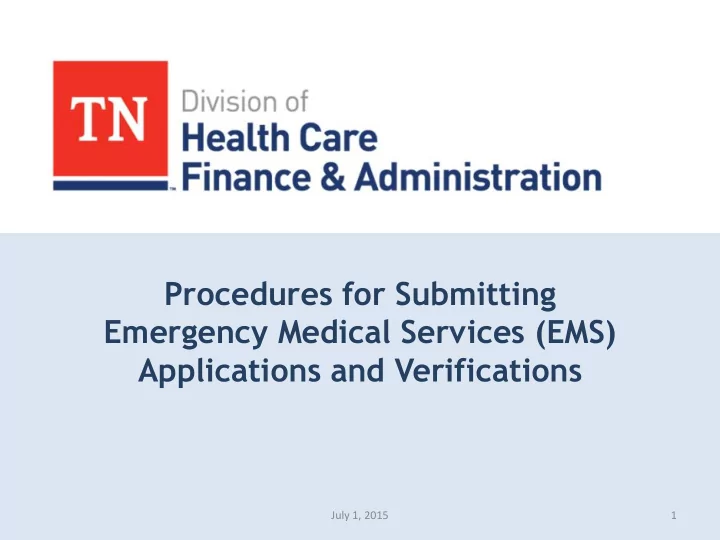

Procedures for Submitting Emergency Medical Services (EMS) Applications and Verifications July 1, 2015 1
Agenda • Policy Statement • Eligibility Requirements • Faxed/Mailed Applications • Effective Dates • Additional Application Requirements • Medical Records • Coverage Spans • Definition of Emergency • Looking to the Future 2
Policy Statement As required by federal law,* TennCare reimburses hospitals for emergency medical services (EMS) for certain non-citizens. TennCare reimburses hospitals for EMS only if the person: • Would be eligible for TennCare if not for his or her citizenship status; AND • Has an EMS period on the date(s) on which he or she received said emergency services; AND • Received emergency services that meet the federal standards. *8 USC § 1611(b)(1)(A); 42 § USC 1396b(v); 42 CFR § 435.139. 3
Eligibility Requirements TennCare only provides reimbursement for emergency medical services under this federal requirement if applicants would be entitled to TennCare if they were U.S. citizens or eligible non-citizens. Such individuals must “group” into, and meet the financial requirements of, a covered eligibility category for which they would be eligible if not for the citizenship requirement. 4
Eligibility Requirements According to 42 CFR § 435.406(b), emergency medical services must be provided to: …residents of the State who otherwise meet the eligibility requirements of the State plan (except for receipt of AFDC, SSI, or State Supplementary payments) who are qualified aliens subject to the 5-year bar or who are non-qualified aliens who meet all Medicaid eligibility criteria, except non-qualified aliens need not present a social security number or document immigration status. 5
Eligibility Requirements TennCare’s reference table at http://www.tn.gov/assets/entities/tenncare/ attachments/eligibilityrefguide.pdf summarizes the financial requirements for each eligibility category. Individuals who do not “group” and who do not meet the financial eligibility requirements are ineligible for TennCare; they would likewise be ineligible for reimbursement for emergency medical services. 6
Faxed/Mailed Applications Effective June 1 st , 2015, HCFA accepts faxed or mailed applications for EMS only at the local service center (Tennessee Health Connection (TNHC)). Applicants: – Use the standard Federally Facilitated Marketplace (FFM) application form; and – Must also send application to FFM. 7
Faxed/Mailed Applications Fax or mail the FFM application and any supporting medical records to TNHC: Tennessee Health Connection P .O. Box 305240 Nashville, TN 37230-5240 Fax: 1-855-315-0669 8
Effective Dates Faxed/mailed application to TNHC: – Effective date is the date the application is received by TNHC (assuming all eligibility conditions are met). FFM application: – Effective date is the application date as determined by the FFM (assuming all eligibility conditions are met). 9
Effective Dates For all emergency services to be covered, the individual’s effective date (or “start date” of the associated eligibility segment) must be on the first date of emergency treatment. If an individual applies on the second day of an emergency spanning four days, then only the second, third, and fourth day may be covered. 10
Add’l Application Requirements The EMS Cover Sheet for Applications/Verifications should be included any time an EMS application or related documents are sent. Applications and all relevant verifications should be clearly marked at the top of each page with “EMS APPLICATION.” Each page of each document should display this information. The original application and fax confirmation should be sent with subsequent documentation. 11
Add’l Application Requirements Medical records and other verifications* will be accepted after the date of application. For accelerated approval, it is recommended that medical records and any available verifications be sent with the application or as soon as is feasible. *EMS requirements to provide income, residency, and other non-clinical 12 verifications are the same as for non-EMS applications.
Medical Records Acceptable medical records include: • Emergency department triage notes; • Emergency department physician notes; • Laboratory reports; • Histories and physicals; and/or • Hospital discharge summaries. Medical records are sought by HCFA to determine whether services fit the definition of an emergency. 13
Medical Records Hospitals may provide the emergency medical documentation at a later date when available. However, hospitals should help an individual apply on the date of service in order to preserve the effective date of coverage. 14
Coverage Spans Coverage is limited to the length of time required to stabilize the emergency episode. Coverage is only provided for the single episode of emergency care. 15
Coverage Spans Example 1: – Providers of emergency services to a non- citizen experiencing a stroke will be reimbursed if the individual is eligible for EMS. – However, providers of rehabilitative services related to the stroke that may be required post-discharge will not be reimbursed. 16
Coverage Spans Example 2: – Medications provided to an individual receiving treatment for an emergency condition may be reimbursed. – However, costs for medications dispensed in an outpatient setting (including a hospital outpatient pharmacy) will not be reimbursed. 17
Definition of Emergency Consistent with federal requirements, clinicians at TennCare evaluate requests for reimbursement for emergency medical services to determine whether the situation was, in fact, an emergency. 18
Definition of Emergency An emergency medical condition is defined by 42 CFR § 440.255 as: The sudden onset of a medical condition manifesting itself by acute symptoms of sufficient severity (including severe pain) such that the absence of immediate medical attention could reasonably be expected to result in: • Placing the patient’s health in serious jeopardy; • Serious impairment to bodily functions; or • Serious dysfunction of any bodily organ or part. 19
Lawyerly Citations Federal law has been consistent on this question. See: – § 1903(v) of the Social Security Act; and – 42 CFR §§ 435.139, 406(b). TennCare policy has likewise remained consistent. See: – Attachment 2.6-A of the TennCare Medicaid State Plan; and – DHS Bulletin No. 41, MA-06-10 (November 16, 2006). 20
Looking to the Future As the FFM’s capabilities improve and additional eligibility systems come online, we will re-evaluate our procedures. 21
Questions? 22
Recommend
More recommend